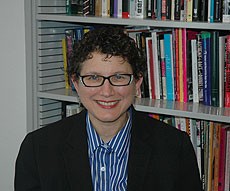March 7, 2005
Films can make a difference, says critic
B. Ruby Rich
By Jennifer McNulty
When film critic B. Ruby Rich goes to the movies, she’s
not looking for big stars and Hollywood glitz. She’s looking
for cutting-edge technique and a message that speaks to the
times.
|

B. Ruby Rich is currently working on her next book, entitled
“The Rise and Fall of New Queer Cinema.”
Photo: Jennifer McNulty
|
“I’m always looking for work that is exciting to
me, that represents a new front in filmmaking,” said Rich,
who joined the faculty last fall as an assistant professor of
community studies.
“And I’m looking for films that make sense of a cultural
moment.”
So forget Million Dollar Baby and think Tarnation,
an autobiographical documentary made for less than $250 by Jonathan
Caouette, who began chronicling his life at the age of 11. Caouette
combined Super-8 home movies, snapshots, old answering machine
messages, and early short films into a film that one writer
called “part documentary, part narrative fiction, part
home movie, and part acid trip.”
Rich, who writes about film for the Guardian of London,
the San Francisco Bay Guardian, Sight & Sound, the
Village Voice, and other publications, has been on the
jury of film festivals from Toronto to Havana, Sydney to Guadalajara.
She has participated in the Sundance Film Festival since 1987,
regularly attends Cannes, and is an expert on Latin American
film and queer cinema.
The author of the 1998 book Chick Flicks: Theories and Memories
of the Feminist Film Movement and countless scholarly
and popular articles about film, Rich is currently working on
her next book, entitled “The Rise and Fall of New Queer
Cinema,” which documents the emergence in the early 1990s
of “amazing new films” by film makers including Todd
Haynes, Sadie Benning, Derek Jarman, and Isaac Julien.
“Their films were unlike anything I’d ever seen before,
with such a different style,” said Rich, who coined the
phrase “new queer cinema” in a 1992 article in the
Village Voice. “They were unapologetic, and they
wanted their films to be for all audiences.”
Films like Poison, Go Fish, and High Art began
showing up at film festivals and winning prizes, and careers
were born. That powerful new wave of queer cinema came out of
a decade of organizing around AIDS, when people turned their
attention to culture and cinema, said Rich. But that momentum
of the early '90s has been lost. What’s left constitutes
the “worst nightmare” of those film pioneers, said
Rich, referring to the “commodification and assimilation”
of queer cinema evident in television shows like Queer Eye
for the Straight Guy and Will and Grace.
“The 1990s were a much more hopeful political moment,”
said Rich, who loves film’s “potential to make a difference.”
“I really do believe film is the literature of our time,”
she said. “Ideas get played out on screen, and we identify
with the characters we see. Film today is a secular religion.
People’s experience of the world is often mediated through
movies.”
To that end, when Rich watches mainstream Hollywood movies,
it's for what they reveal about U.S. culture, and she monitors
them with a critical eye for what they offer audiences. Last
year, she was struck by the plethora of “revenge films,”
including Mystic River, Kill Bill, and 21 Grams,
and wrote a piece about the shortcomings of U.S. film in the
post-9/11 era, when instead of revenge, filmmakers had an opportunity
to focus on “regret.”
“Every once in a while, I get so fed up that I have to
write something,” said Rich, adding that she thinks international
cinema is becoming more important than ever as the United States
becomes more xenophobic. Online DVD movie rental services like
Netflix are “a dream come true” because they make
watching movies “as easy as getting a book from the library”
and expand the reach of low-budget, independent films and international
cinema, she said.
Rich will teach Community Studies147, The Rise and Fall
of the New Queer Cinema, this spring and looks forward to
the arrival in September of the first students in the new community
studies master’s program in social documentation. Having
made her living through film since she was an undergraduate
at Yale—when she sold popcorn at Film Society screenings
to pay the rent--Rich is hopeful about the future of film. Just
don’t get her started on the Oscars.
“My friends forced me to watch,” she said with a
laugh. “I hated it, just like always.”
Here is a short list of recent movies that Rich recommends:
• Eternal Sunshine of the Spotless Mind
• Bad Education
• Maria Full of Grace
• Control Room
• The Corporation
• Gunner Palace
• Mondovino
• The Holy Girl (La Niña Santa)
Return to Front Page